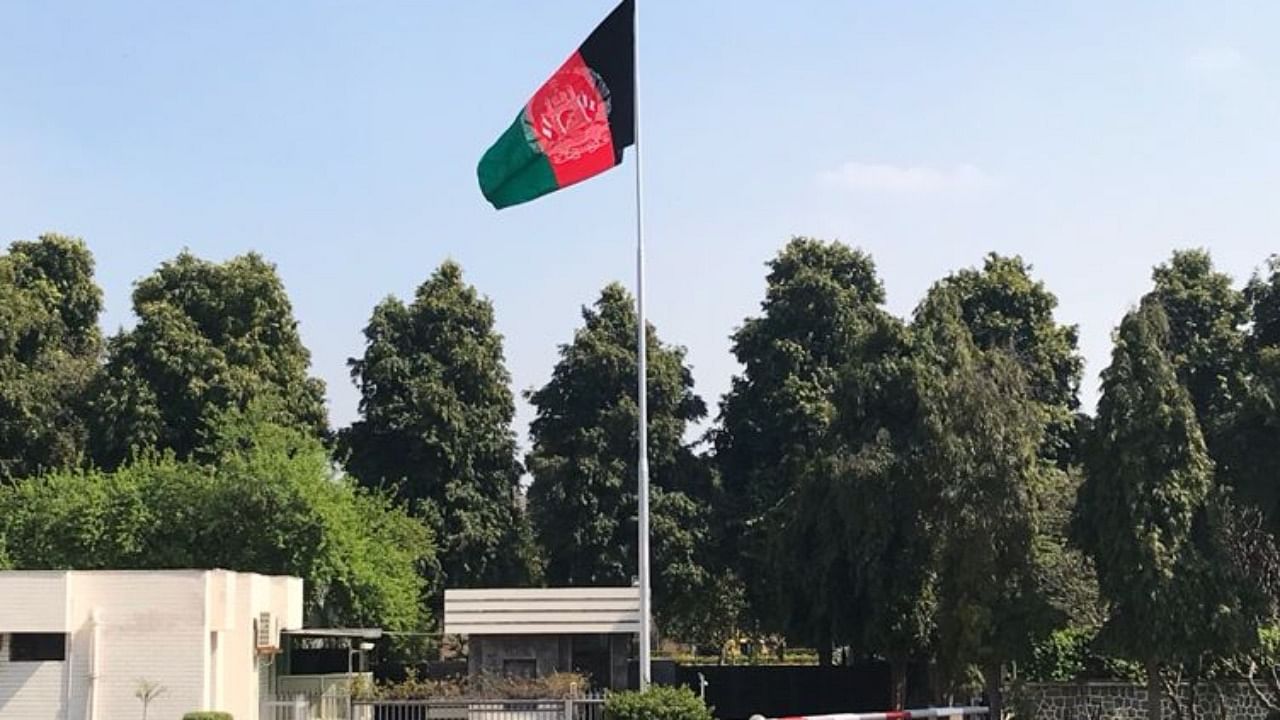
Afghan diplomats from New Delhi to New York have refused to pledge allegiance to the government the Taliban announced in Kabul.
A day after the Taliban announced its government in Kabul, the red-green-black national flag of the Islamic Republic of Afghanistan continued to flutter high at its embassy in Chanakyapuri New Delhi as the diplomats of the war-torn nation refused to pledge allegiance to the emirate the militants sought to reinstate.
Not only the ones in New Delhi, Afghan diplomats posted at the United Nations headquarters in New York as well as in Washington D.C., London and other capitals around the world also refused to acknowledge the change of regime in Kabul.
Afghanistan’s envoy to the United Nations in New York, Ghulam Isaczai, urged the international organisation on Wednesday “to continue to reject the reinstatement of the Islamic Emirate, hold the Taliban to account for violation of human rights and international humanitarian law and insist on an inclusive government”. He said that the interim government announced by the Taliban on Tuesday was “anything but inclusive”.
The Embassy of Afghanistan in New Delhi stated that it did not represent the new regime. The embassy will continue to represent the Islamic Republic of Afghanistan in India and not the Islamic Emirate of Afghanistan established by the Taliban, said Abdulhaq Azad, a spokesperson of the war-torn country’s diplomatic mission here. “The Embassy of the Islamic Republic of Afghanistan in New Delhi will continue to provide services to the citizens of Afghanistan in India,” Azad told the DH in New Delhi.
In a move to claim the continuation of the Government of the Islamic Republic of Afghanistan, a statement was issued on behalf of its Ministry of Foreign Affairs, alleging that the “so-called cabinet” announced by the Taliban would undermine political, ethnic and social diversity of Afghanistan. It said that the national tricolours were flying at all diplomatic missions of the nation and they would continue “normal functions and duties based on the Constitution of the Islamic Republic of Afghanistan”.
The acting Prime Minister of the Taliban’s government in Afghanistan, Mullah Hasan Akhund, and the acting Interior Minister Sirajuddin Haqqani are among the ones who are under UN sanctions.
Ashraf Haidari, Afghanistan’s ambassador to Sri Lanka, slammed the new government announced by the Taliban in Kabul on Tuesday. He pointed out in a tweet from Colombo that the new government was led by people under the UN sanctions, driven by the clerics, included no woman and represented only one ethnic community out of 55 in Afghanistan.
Said T Jawad, Kabul’s envoy to Moscow, retweeted a video of protests by Afghans in front of the Embassy of Pakistan in the capital of his country. Tahir Qadiry, Afghanistan’s ambassador to Poland, posted on Twitter a picture of a militant brandishing his gun to stop men and women protesting against the Taliban in Kabul. Shukria Barakzai, Kabul’s envoy to Oslo, also retweeted pictures and videos of protests against the Taliban.
The Taliban took over Kabul on August 15 after occupying most of the provincial capitals across Afghanistan in a swift military blitz, taking advantage of the withdrawal of the US troops. It declared on August 19 reinstatement of the Islamic Emirate of Afghanistan, which had ceased to exist after the US military offensive in the wake of the 9/11 attacks had overthrown Mullah Omar’s Government in Kabul in 2001. The Islamic Republic of Afghanistan had come into existence in 2004 with the adoption of the new Constitution.
The militants also lowered the national flag of the Islamic Republic of Afghanistan from the presidential palace in Kabul and raised the Emirate’s white flag with Islamic oath ‘Shahada’ written on it in black.
Check out latest DH videos here:
